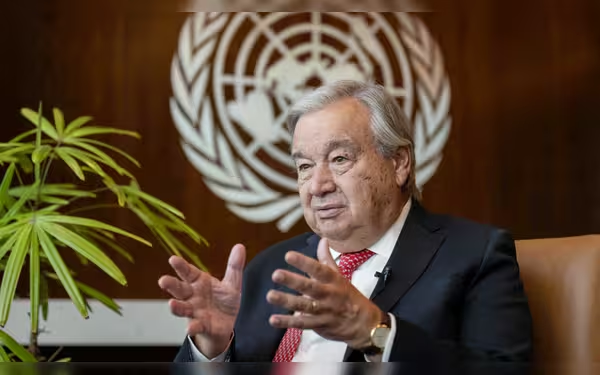Saturday, November 16, 2024 07:38 PM
UN Chief Condemns Collective Punishment of Palestinians Amid Gaza Crisis
- UN chief calls Gaza suffering 'unimaginable'.
- Guterres demands accountability for civilian deaths.
- Ceasefire negotiations remain stalled between Israel and Hamas.
 Image Credits: arabnewspk
Image Credits: arabnewspkUN chief Antonio Guterres condemns Israel's actions in Gaza as collective punishment, urging for accountability and a ceasefire amid escalating humanitarian crisis.
The ongoing conflict between Israel and Hamas has escalated to alarming levels, drawing international attention and condemnation. Recently, UN Secretary-General Antonio Guterres expressed his deep concern regarding the situation in Gaza, where the people are facing what he described as "unimaginable" suffering. This statement comes as the United Nations prepares to host world leaders, highlighting the urgent need for dialogue and resolution.
Guterres firmly stated that nothing can justify Israel's actions, which he characterized as "collective punishment" against the Palestinian people. He emphasized that the level of suffering in Gaza is unprecedented, noting the high number of deaths and destruction that have occurred since the conflict intensified. The UN chief condemned the terror attacks carried out by Hamas, acknowledging that these actions violate international humanitarian law. However, he stressed that such violations do not excuse the suffering inflicted upon innocent civilians in Gaza.
On October 7, Hamas launched an attack that resulted in the deaths of over 1,200 individuals, primarily civilians. In retaliation, Israel has vowed to eliminate Hamas, leading to a devastating military campaign that has reportedly claimed over 41,000 lives in Gaza. The humanitarian crisis has worsened, with more than 200 humanitarian workers, including UN staff, losing their lives in the conflict.
Guterres called for accountability regarding civilian deaths, acknowledging that both Israel and Hamas have committed serious violations. He has repeatedly urged for an immediate ceasefire, yet negotiations mediated by the United States, Egypt, and Qatar have stalled, with both sides blaming each other for the lack of progress.
Despite the challenges, Guterres remains hopeful for a resolution, although he noted that talks have been "endless" and reaching a compromise would be "very difficult." He expressed disappointment over Israeli Prime Minister Benjamin Netanyahu's refusal to engage in dialogue, indicating that this lack of communication could hinder potential breakthroughs during the upcoming General Assembly.
Guterres also highlighted the ongoing denial of the two-state solution, which he believes is being undermined by actions such as land grabs and illegal settlements. He pointed out that these actions contribute to the cycle of violence and suffering in the region, calling for a renewed commitment to peace and justice.
In addition to the situation in Gaza, Guterres addressed the challenges faced by UN missions globally, particularly in Haiti, where a lack of funding has hampered efforts to maintain peace. He criticized the Security Council and international financial institutions for being outdated and dysfunctional, stating that they often lack the power and resources needed to effectively address conflicts.
The plight of the Palestinian people in Gaza is a pressing humanitarian issue that demands immediate attention and action from the international community. As the UN prepares to engage with world leaders, it is crucial to prioritize dialogue and seek solutions that uphold human rights and dignity for all. The path to peace may be fraught with challenges, but it is essential for the future stability of the region and the well-being of its people.













